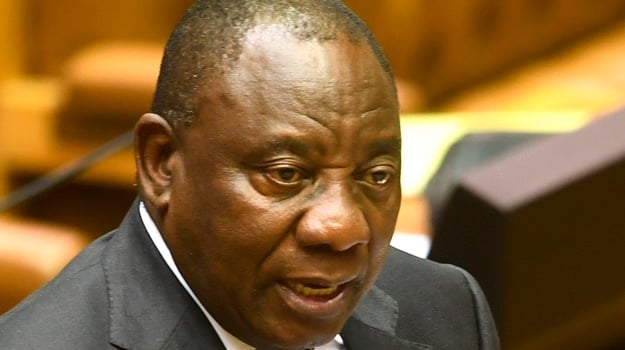President Cyril Ramaphosa will answer questions in the National Assembly on Wednesday, two of which centre around the contentious land expropriation debate.

Ramaphosa says Cabinet will be announcing details of stimulus package to reunite growth of the economy.
"This package prioritises funds for initiatives that are labour intensive and boosts local economies. This is the job of government.
"We also expect other actors to play their part. And bring forward proposals that have efficacy and can lead to real job creation."
Ramaphosa: "We have prioritised the task of raising investment levels in the economy, since it is essential for growth and job creation.
"One of the ways is through investment."
Ramaphosa: "Today, we have 16.3 million people who are employed. In 25 years we have doubled the number of unemployment rate in our country."
"What about the unemployment RATE?" the DA caucus shouts.
Ramaphosa admits that the unemployment figures are "quite high".
Some DA MPs groan and put their head in their hands. "They're dire," one shouts.
Ramaphosa continues to slam gentrification and forced evictions of generational families from in-demand urban suburbs.
He says the country should stop acts that resemble apartheid.
Ramaphosa now answers a question posed by NFP MP Sheik Imam.
Ramaphosa: "We want our people to have a better life. In fact, we would say we need all of us to move away from acts that will result in evitction of people.
"If there are areas where people are being evicted, we say, it must stop. We cannot go back to the methods of the apartheid regime."
They must at all times put the interest of people first.
"Our lives of our people count much more than the amount of money they can make in selling pieces of land.
"Those moves to sell land over the heads of our people must stop. We must have discussions to resolve with the issue.
"I am totally opposed to evictions of people, the mass movement of people from areas, especially from places where they have lived in forever and a day."
He relays how his family was moved in the 1960s to Soweto.
Ramaphosa says there is also privately owned land in the city that is lying fallow or not being used.
"Our entities, our local governments must examine all of that, so we can package... on an informed basis, how to deal with land like that.
"So we agree with you, that's what we will do."
He summarises again that the target for land in the cities is land already owned by the state and government entities, and they want to release that land.
Ramaphosa: Many of our people want to build their houses in the urban areas.
Our new development is that we should move our people closer to economic centres of our economy, and the measures we should take include expropriation, release of land, and should enable us to give effect.
We want rapid release of publicly owned land.
Ramaphosa: "Coming back to what you have asked, our people need land where they can build their homes and farms.
"Some of this land is urban areas, and our lekgotla decided that we should provide a rapid release of [urban] land.
"We will start with land already owned by our various entities. Our government entities own vast tracts of land in the urban areas.
"Our people must be given the land, and we must release the land.
"It is for public interest and we are advancing their interests."
EFF leader Julius Malema addresses the throwing out of the Fees Must Fall protester.
He says Ramaphosa should have answered him, and it sends a message that they deal with protest with violence.
He moves on to his question.
He says that the apartheid regime moved black people to townships to ensure they lived in "concentration camps".
"Have you discussed with the minister of land reform to bring our people out of these concentration camps?"
He wants to know if plans are afoot to bring those on the periphery of the cities will get land closer to urban CBDs.
"When we deal with issues of spatial land development, we need to take into account the values enshrined in our Constitution," Ramaphosa says.
"They seek to ask how we embrace our diversity so we can lead a prosperous life.
"To do so, we have to take measures that will move us away from the divisions created about our apartheid past."Government must therefore make provisions to outline how land is redistributed.
"It's precisely this that we want to focus on to ensure our land reform programme impacts positively on our people."
The man stands with a poster, and continues to shout simply "Fees. Must. Fall. Fees. Must. Fall."
Around five members of Parliamentary security throw him out.
Ramaphosa says urban spatial planning of the former regime has a direct impact on household incomes on the poor.
"According to Stats SA, more than two-thirds of households in the lowest income group spend 25% on public transport," he says.
"We must make our cities generators of wealth and productivity.
"The only way we can do that is make people live much closer to where they work."
President Ramaphosa is invited the podium and the ANC caucus stands and applauds.
Deputy President David Mabuza remains seated, and DA MPs shout, "He isn't standing? Is something wrong?"
Both Ramaphosa and Mabuza giggle to themselves.
Ramaphosa answers the first question on urban spatial patterns.